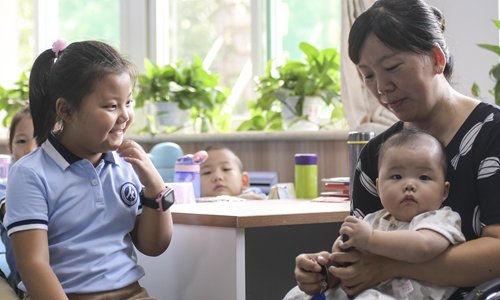
A mother holds her second child and accompanies her elder daughter to her first class of a new semester of the Primary School Affiliated to Shandong Normal University in Ji'nan on September 3. Photo: VCG
Despite the downward trend in the number of newborns and fertility rate amid a deepening aging problem, China will still maintain its advantages in population size in the long run, where the demographic dividend will continue to exist and the talent dividend will become more dominant, state authorities said on Wednesday.
Experts noted that the measures recently rolled out marked a U-turn in the family planning policy from limiting the number of children per household to a more encouraging note of having three per family being better. The major shift in policy is believed to stabilize the fertility level at an appropriate point, and ensure a labor force large enough for the healthy growth of the economy.
While the overall population growth momentum in China continues to decline, the country will still maintain its advantages in population size in the long run, Ou Xiaoli, head of the social development bureau at the National Development and Reform Commission, said on Wednesday at a press conference.
In 2020, the number of working-age people in China was about 990 million, which was more than the combined total in the US and developed countries in Europe. In 2050, it will still be about 300 million more than working-age population in West developed nations, Wang Pei'an, deputy director of the Committee of Population, Resources and Environment of the National Committee of the Chinese People's Political Consultative Conference, said on Wednesday, media reported.
The demographic dividend will continue to exist, added to an emerging talent dividend from the significant rise of education levels in the past decade, with the average years of education increasing from 9.7 years in 2010 to 10.8 years in 2020, Ou noted.
The experts' remarks refuted a Bloomberg report published earlier this month, which claimed that the low fertility rate has indicated a peak in China's working-age population.
Wednesday's media briefing came after China on Tuesday released a document in which it vowed to revise the law on population and family planning, giving full legal weight to the third-child policy.
Measures to encourage births were rolled out, ranging from tax breaks to more nurseries and flexible work leave.
One significant highlight of the decision was the abolition of the controversial "social maintenance fee," an administrative charge imposed on couples who had extra children outside of China's previous family planning policy.
Demographic experts believe that the decision is a huge shift in family planning policy, which will have significant influence for China and the world.
"It marks the end of the era for birth restriction and the beginning of a new one that encourages households to raise more children," Huang Wenzheng, a demography expert and senior researcher at the Center for China and Globalization, told the Global Times on Wednesday.
However, more powerful incentives are needed to boost people's willingness to have children, given the outlook of today's fertility rate in China that is even graver than that in some developed countries, Huang added.
The third-child policy does not indicate a complete opening for Chinese to have babies, Wang Pei'an said.
He explained that the decision took into consideration both the will of people and the country's macro- and socio-economic progress, with the aim of adjusting the pace of population growth into one more compatible with the resources and development of the country.



